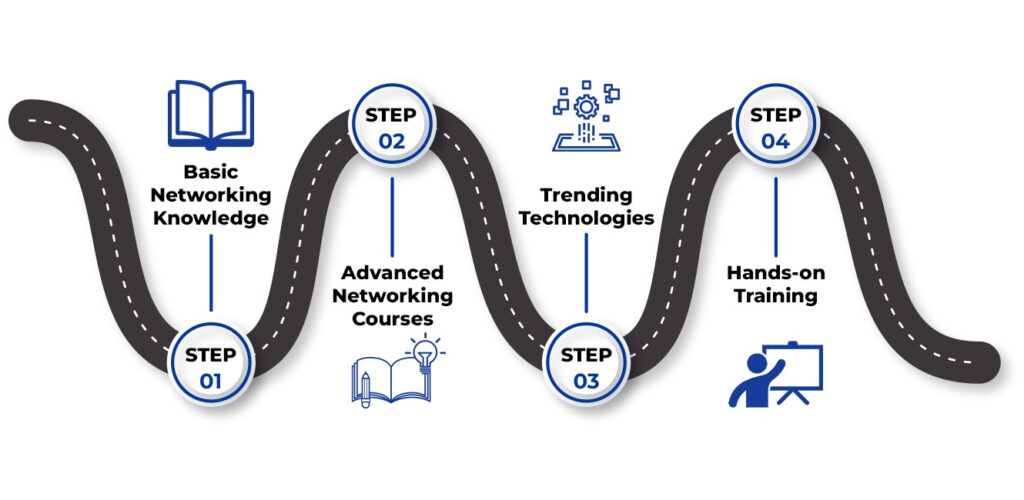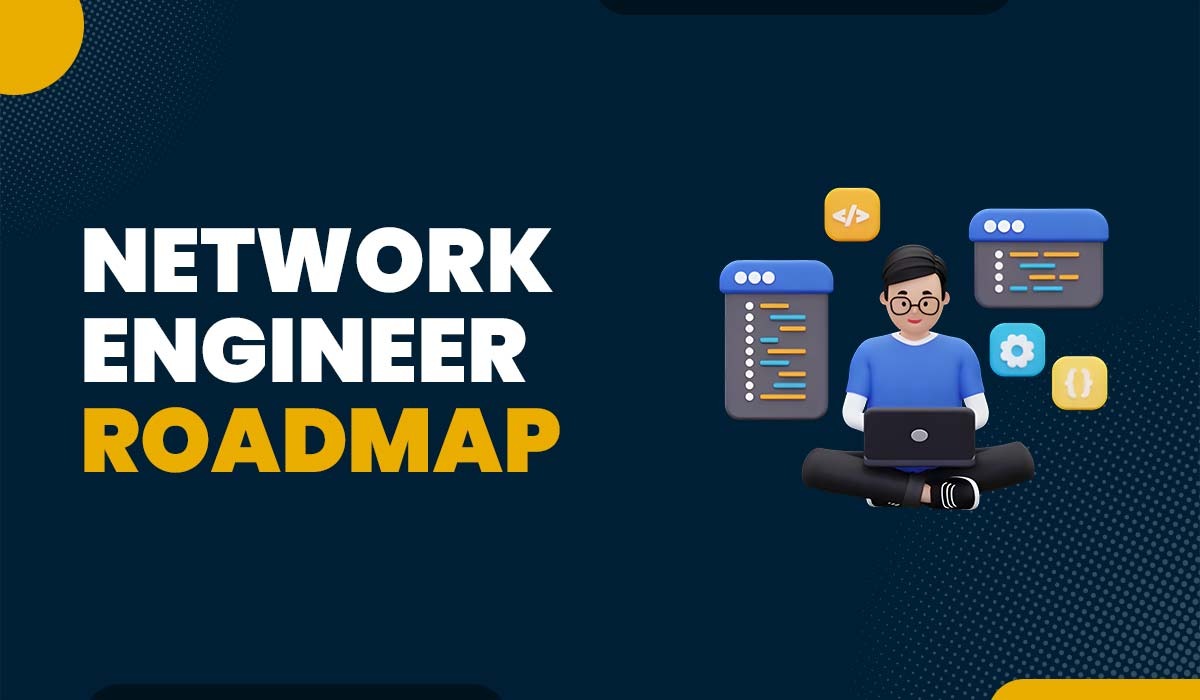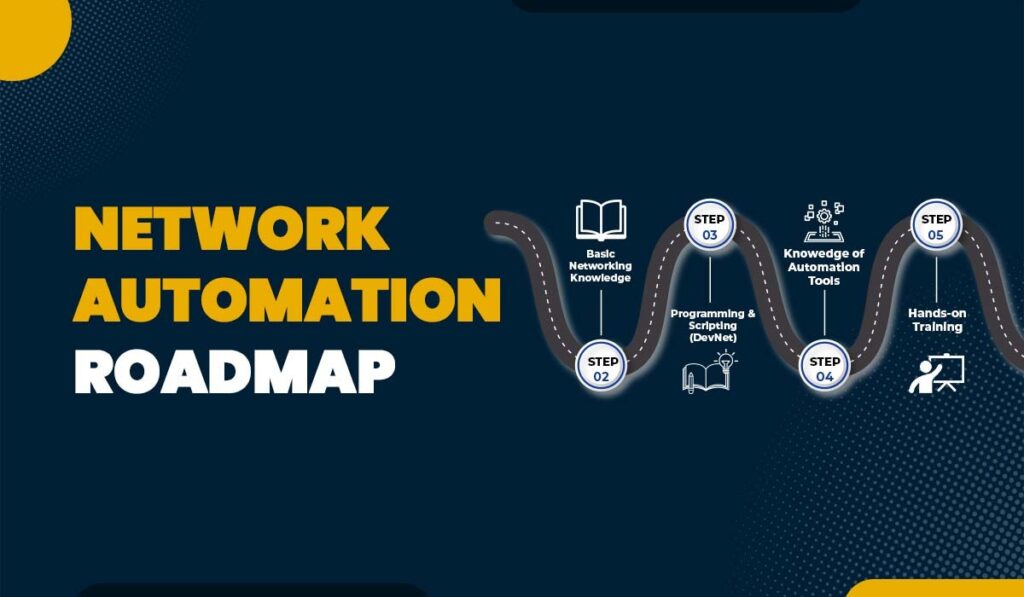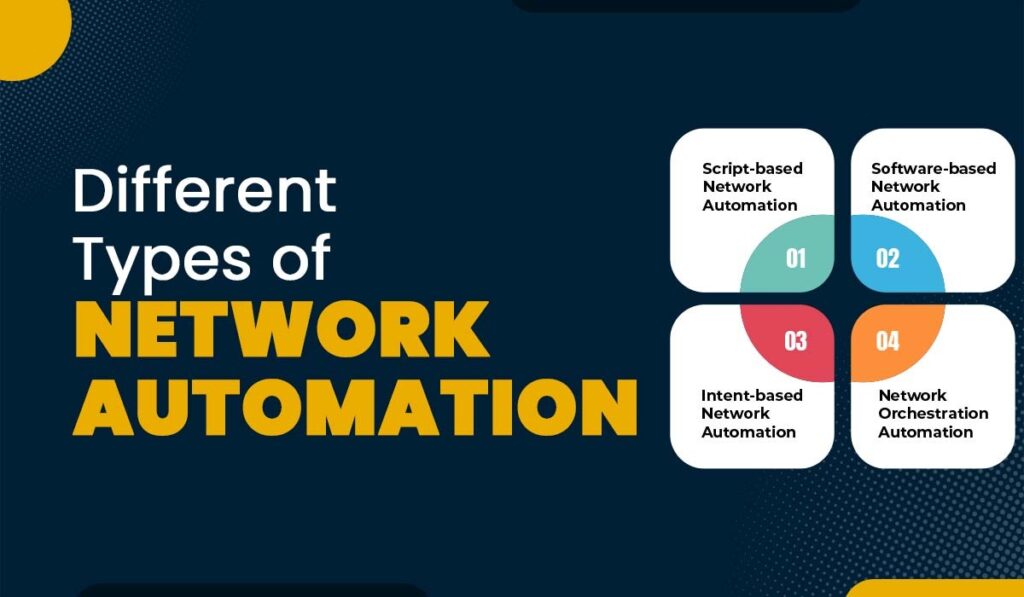Introduction
Networking allows devices, individuals, and organizations to communicate with one another irrespective of physical location. As part of your role in network engineering, you take on responsibility for designing, deploying, and managing network infrastructure that further helps organizations operate at a large scale. If you’re looking for a Network Engineer Roadmap, understanding these responsibilities is a crucial first step. There is a high demand for network engineers, which directly offers better career opportunities in the future. The reason behind the high demand is directly connected to significant technological investments in 5G, IoT, and cloud networking.
Over the next five years, GlobalData reports that the global networking market will grow from its 2023 value of $436.88 billion to reach $577.56 billion by 2028. The choice to pursue network engineering as a profession or to shift into it leads students as well as professionals to become part of the networking field that shows powerful market expansion alongside space for self-development. Today, in this blog, we will discuss the network engineer roadmap that will help you become a network engineer or enhance your networking skills.
Now that you have a basic idea of the opportunities that await you in this industry. Let us now understand what network engineering is and why it matters.
Understanding Network Engineering and Why to Choose
Network engineering is a subfield of IT that handles the development, execution, and supervision of computer networks. It covers a range of responsibilities, including but not limited to:
- Designing network configurations: Network engineers need to pick appropriate hardware and software solutions to build efficient and protected networks.
- Troubleshooting network issues: Through troubleshooting, network engineers maintain network connectivity.
- Implementing security measures: Network engineers need continuous awareness about potential vulnerabilities because security threats against networks escalate every year.
This is what a network engineer do. Demand for network engineers grows proportionally with the expansion of technologies. For example, implementing 5G networks drives a substantial rise in the requirement for experienced network management specialists. The market demand for skilled network engineers keeps rising as companies adopt cloud networking approaches to achieve enhanced performance as well as scalability and business flexibility.
Now let us discuss the roadmap for network engineers. In this section, we will cover both beginners as well as professionals who already are part of the networking field.
Complete Network Engineer Roadmap for 2025
Below, we have discussed steps that directly help you understand the network engineer roadmap.

1. The Educational Foundation
The first and foremost step in the network engineer roadmap is to have basic networking knowledge and computers. However, having a degree in computer science or information technology can sometimes be helpful. Most network engineers come to this profession via a different path. If you do not have any technical background, go for the below-discussed concepts or choose CCNA (Cisco Certified Network Associate) as your starting course.
Networking Fundamentals
Recognizing basic concepts is crucial for any person wishing to pursue a career in Network engineering. You should be able to describe data flow across the networks, preferably covering some of the most frequent connection problems. Here are vital topics you must cover:
- TCP/IP: TCP/IP, referred to as The Transmission Control Protocol/Internet Protocol, sets the standards of how information moves from one point to the other.
- DNS: DNS prime work is to convert domain names that are understandable by human beings into a format understandable by computers.
- DHCP: Dynamic Host Configuration Protocol is a method by which IP addresses are assigned to devices on a network.
Besides this, it will be useful to know HTTP/HTTPS and routing protocols such as BGP and OSPF. It also includes knowledge about IP addresses, Subnetting, etc.
Network Security
As cyber threats continue to expand at an alarming rate. This is the main reason to have security knowledge. You should have a basic understanding of:
- Firewalls: Devices by which incoming and outgoing network traffic is regulated.
- VPNs: Virtual Private Networks are a way to secure your internet connection.
- Encryption Protocols: Protocols that guard data as it moves within a network.
Hardware Knowledge
Familiarity with hardware devices such as:
- Routers: Routers are computing devices that transmit data packets from one computer network to another.
- Switches: Network Switch allow communication between the multiple devices in the same network.
- Access Points: Make wireless devices to join the wired ones.
With such understanding, you can get started; if you are a newcomer who wishes to get into the networking field, try Cisco’s entry-level Course – CCNA Course. This course covers networking principles, security fundamentals, and IP services, among other topics, effectively allowing entry into the networking domain.
CCNA is enough to become a network engineer; however, if you want to become a sound network engineer, you should at least learn CCNP ENCOR and ENARSI. These courses will help you understand routing and switching, which are essential skills for a network engineer.
2. Choosing a Track as Per Your Interest
Next step in Network Engineer Roadmap is choosing a track. After learning fundamental concepts, consider moving to a specific niche that aligns with your interests. Here are a few key areas in network engineering you might explore:
AI and ML
Artificial Intelligence (AI), together with Machine Learning (ML), rapidly reinvents how the IT field operates. Modern businesses use these technologies to both enhance operational efficiency and build predictive systems while streamlining automated procedures. You can enroll in a AI and ML Course to become an expert in these technologies.
Key Topics:
- Programming fundamentals (e.g., Python)
- Basic Concepts of Networking relevant to AI/ML
- Python for AI/ML and Networking
- Working with network data, including parsing & analyzing network logs. Basic data manipulation techniques
- Fundamentals of Machine Learning and Artificial Intelligence
- Introduction to Language Models (LMs)
- Creating Language Models
- Predictive AI for Networking
- Generative AI’s Application in Network Engineering
Automation & Programming Languages
Network engineering will heavily depend on automation technology over the upcoming years. Programming language expertise, along with automation tool knowledge, will substantially improve your job market opportunities. You might consider courses such as:
- DevNet Associate: The DevNet Associate Training program provides you with an essential understanding of how software-building concepts merge with network fundamentals. Through this course, you will learn fundamental programming principles and API management techniques alongside programming scripting applications.
- Key Topics:
- Programming fundamentals (e.g., Python for Network Engineers)
- APIs (RESTful APIs)
- Basic Linux skills
- Application deployment and orchestration
- Network automation concepts
- Key Topics:
- CCNP DevNet: CCNP DevNet helps you to advance from DevNet Associate skills by learning sophisticated automation techniques along with advanced programmability and integration with networking systems.
- Key Topics:
- Advanced Python for network automation
- CI/CD pipelines for network applications
- Monitoring and troubleshooting automated networks
- Implementation of scalable and efficient network automation solutions
- Key Topics:
- DevNet Expert: This is the topmost course in DevNet certifications. The DevNet Expert Course focuses on advanced automation techniques and strategies to enhance network operations.
- Key Topics:
- Complex automation designs
- Integration of multiple automation tools
- Network optimization and performance monitoring
- Hands-on experience in real-world scenarios
- Key Topics:
Advanced Routing and Switching
If routing and switching is your passion, then you can do CCIE Enterprise after CCNP ENCOR + ENARSI.
CCIE Enterprise: The CCIE certification is among the most prestigious in the networking field or the Enterprise domain. This certification showcases deep technical expertise in enterprise networking. You can take the CCIE Enterprise Course to prepare for this prestigious certification.
Key Topics:
- Advanced network design principles
- Complex troubleshooting and optimization techniques
- Preparation for hands-on lab assessments
Security Domain
Those interested in security matters should consider building expertise in the security side for networking. Recommended certifications include:
- CCNP Security (SCOR 350-701): The certification guides you through enterprise security solutions while allowing you to learn protective network practices. You can take CCNP Security Training to pursue this certification.
- Key Topics:
- Implementation of security policies and procedures
- Security architecture principles
- Threat detection and response
- Key Topics:
- Cybersecurity CEHv13 (Certified Ethical Hacker): This widely respected certification teaches you the mindset and tools of hackers, allowing you to better defend against them. CEH Course is the perfect course to start your cybersecurity career.
- Key Topics:
- Ethical hacking techniques and methodologies
- Penetration testing frameworks
- Vulnerability assessment and management
- Key Topics:
These are various tracks you can choose under Network Engineer Roadmap.
3. Learn current technologies to stay updated
Another crucial step in the roadmap for network engineers is to stay updated. You need to stay updated with job market changes because skill development remains vital. SD-WAN (Software-Defined Wide Area Networks) technology is now transforming organizational network practices. Hence, professionals must learn these new technologies.
- Cisco SD-WAN (Viptela 300-415): Cisco SD-WAN Catalyst (Formerly Viptela) technology offers organizations a dependable, secure platform that delivers network performance improvements alongside cloud-based delivery options. The solution allows easier network control through secure connectivity across distributed locations. Hence, going for such a Cisco SD-WAN course will help you in your career progression.
- Key Topics:
- Architecture Components
- Deployment Models
- Traffic Management
- Security Framework
- Troubleshooting and Monitoring
- Key Topics:
- Versa SD-WAN: The Versa SD-WAN is an all-in-one product that integrates networking and security capabilities within a unified platform. Its purpose is to provide the best application performance with lower operational costs. It is highly recommended to go for such a Versa SD-WAN course if you want to learn SD-WAN.
- Key Topics:
- SD-WAN Architecture
- Application-Aware Routing
- Security Integration
- Management and Orchestration
- Analytics and Reporting
- Key Topics:
4. Getting Practical Experience
The theory is of little benefit without practice. Here’s how you can get practical experience:
- Home Lab: Either use physical equipment or use GNS3 or Packet Tracer to create a virtual environment. It allows you to play with network settings and troubleshooting in a controlled environment.
- Internships and Entry-Level Roles: Look out for internships or junior positions where you can work under professional network engineers. A help desk or technical support job will give you experience in understanding network problems from a user perspective.
- Open-Source Projects: The best way to build network technical skills as well as your professional connections is to volunteer for open-source networking projects.
These are the steps of a network engineer roadmap. If you follow these, you will become a sound network engineer.
Frequently Asked Questions
Q1. What is the roadmap to become a network engineer?
The network engineer roadmap includes a series of steps. Your journey starts with a bachelor’s degree or diploma and then moves up to recognized certifications such as CCNA, CCNP, or CCIE as per your interest and build a strong foundation and expertise to excel in the networking field.
Q2. Is network engineer an IT job?
Yes, Network engineering is a subset of the IT field. Hence, a network engineer job is an IT job.
Q3. What is the career progression for a network engineer?
Career progression for a network engineer revolves around the niche you want to make your career in. This includes CCNP ENCOR for enterprise networking, CCNP SCOR for security, and many more.
Q4. Is CCNA enough for network engineers?
For beginners having little or no knowledge of networking, CCNA is enough. If you want to excel and apply for high-paying jobs, you must move up the ladder of certifications such as CCNP or CCIE following the network engineer roadmap.
Conclusion
With boundless opportunities to explore and the opportunity to learn daily, becoming a network engineer is one of the best things that can happen in your life. Your skills and knowledge need to evolve alongside technology. With a proper understanding of networking basics, pursuing the networking specialization that interests you, and getting the necessary certifications, you are on your way to becoming a successful Network Engineer. The roadmap for network engineers that we have discussed in this blog not only helps you develop new skills but also makes you stand in the competitive job market.
So, by making some effort, following the Network Engineer Roadmap, and developing specific skills, you can become a real asset in the field of networking. Do not forget to network with other professionals, join forums, and keep looking for learning opportunities.





